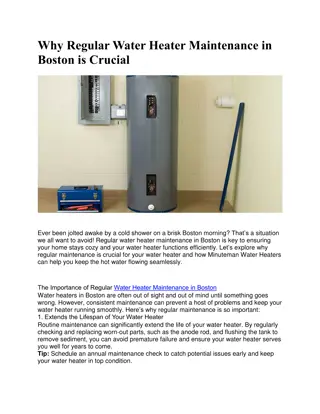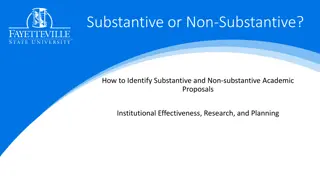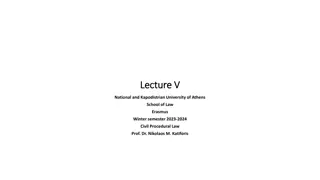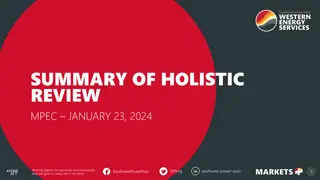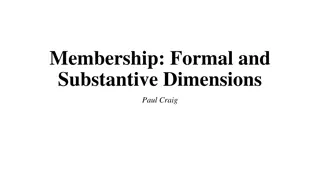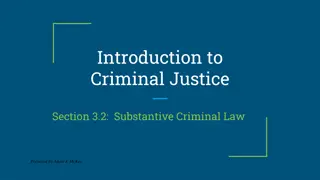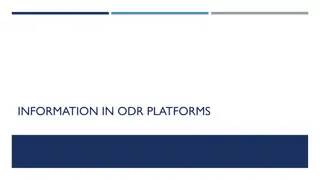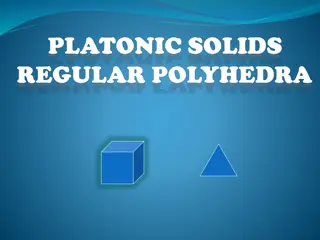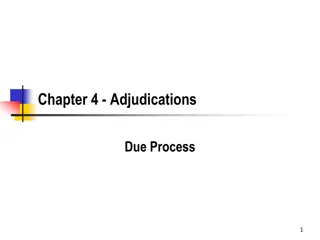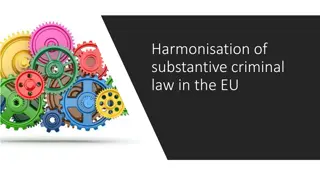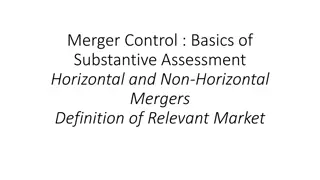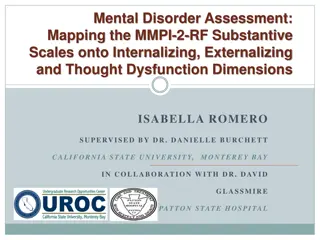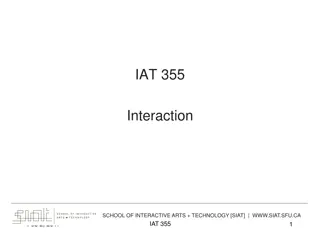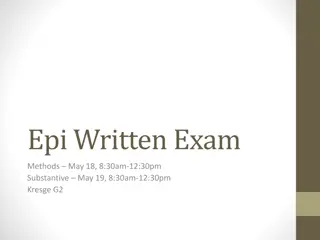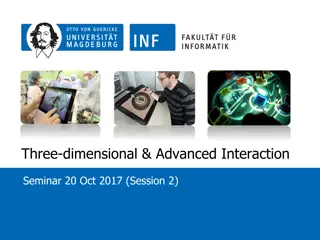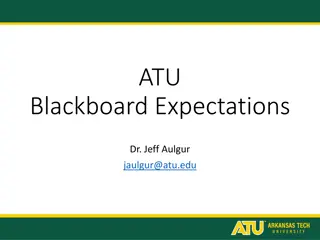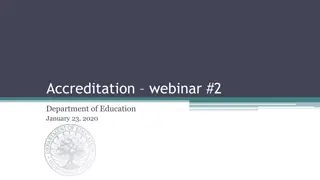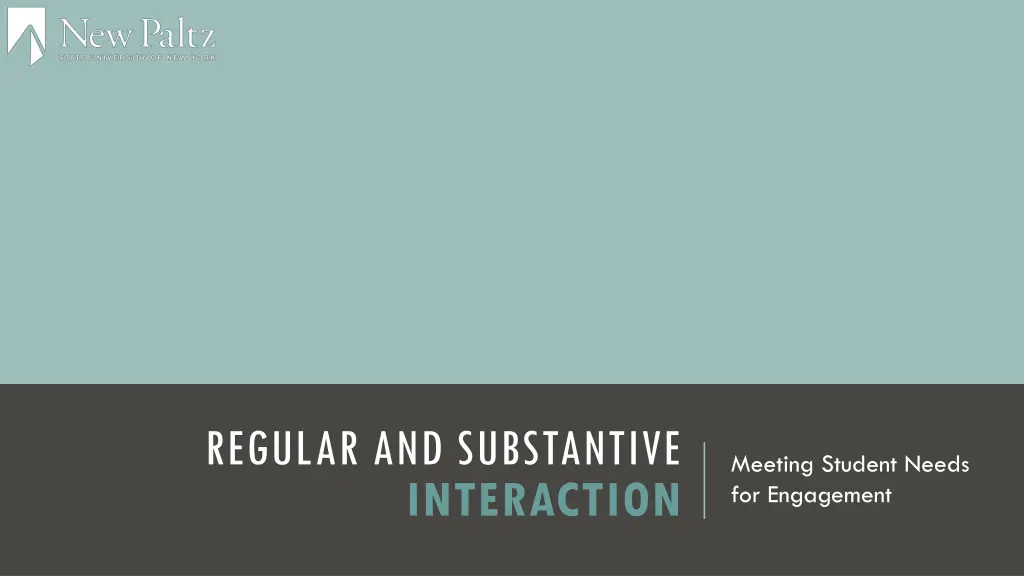
Meeting Student Needs for Engagement through Regular and Substantive Interaction
Explore course requirements for Spring 2021 focused on facilitating regular interaction, engaging instructional activities, and developing leadership skills in political science education. Enhance knowledge and skills through planned, predictable engagement methods.
Uploaded on | 0 Views
Download Presentation

Please find below an Image/Link to download the presentation.
The content on the website is provided AS IS for your information and personal use only. It may not be sold, licensed, or shared on other websites without obtaining consent from the author. If you encounter any issues during the download, it is possible that the publisher has removed the file from their server.
You are allowed to download the files provided on this website for personal or commercial use, subject to the condition that they are used lawfully. All files are the property of their respective owners.
The content on the website is provided AS IS for your information and personal use only. It may not be sold, licensed, or shared on other websites without obtaining consent from the author.
E N D
Presentation Transcript
REGULAR AND SUBSTANTIVE INTERACTION Meeting Student Needs for Engagement
COURSE REQUIREMENTS FOR SPRING 2021 Regular Interaction Substantive Interaction Assessment/feedback on student coursework Direct instruction Provision of information or responding to questions about course work Facilitation of group discussion of coursework or study groups An opportunity for live office hours via phone or web-conferencing (connection beyond email exchange) Facilitation of team projects or student presentations Opportunities for feedback from students via surveys, discussion boards, or web- conferencing Other means of ensuring substantive interaction not named above
REGULAR INTERACTION Planning to Engage
Planned Predictable WHAT IS REGULAR? Perpetual Punctual
Knowledge | Upon completion of the course, students will: Learning Outcome 1. Describe the scope of political science within the 5 sub-fields a. US government and electoral systems b. International relations c. Public policy d. Political theory/philosophy e. Empirical/descriptive theories of political science Skills | Upon completion of the course, students will: Instructional Activities Read textbook Class lectures Class discussion In class team research design plan (think/pair/share) Assignments Departmental pre-test Open book quizzes Close book, comprehensive Final Exam Low stakes writing assignment o Which sorts of questions/methods/approaches are of most interest to you? Learning Outcome Instructional Activities Assignments 1. Identify reliable resources that provide accurate information about political science (information literacy) Bouncing balls and apes It s not DEMOCRACY/Old or young lady Library tour Acadia tutorial Create a hoax Political lens (and how it blinds us) Lecture Class discussion Dept Rubric Reading materials (How to Write Good) How to write a thesis Lecture Discussion Bring in upper classmen as role models Bring in student clubs/organizations Ideology quizzes on line Googling before Class (google pro/con gun control re: 2ndamendment, then read 2ndamendment, then chart, compare, evaluate and critique) Analyze an opinion piece Annotated bib 2. Write clearly about politics, policy and/or law Departmental performance task assessment Low stakes writing assignment(s) Critique an essay using the dept rubric Write a persuasive essay articulating your political values in a manner that is well-organized, free of mechanical errors and cites appropriate authorities Design and implement a program of study based on the requirements of the major As part of student portfolio extra and co-curricular activities Peer review assignment 3. Exhibit leadership skills Attitudes | Upon completion of the course, students will: Learning Outcome 1. Develop an interest to take action or be engaged Instructional Activities Lecture Discussion Bring in upper classmen as role models Bring in student clubs/organizations Lecture Discussion Assignments Course Mapping Sample Activity passport Engage in curricular and co-curricular opportunities identified in Skills #4 2. Value holistic reflection about one s learning Design and implement a student portfolio
MODULE MAPPING TEMPLATE
ASSESSMENT/FEEDBACK ON STUDENT COURSEWORK Utilize commenting features when grading assignments Setup grade- center from the start Return grades in a reasonable amount of time Using Knowmia to record narrated feedback on assignments Create milestone assignments (either instructor or peer reviewed) Schedule group feedback sessions
PROVISION OF INFORMATION OR RESPONDING TO QUESTIONS ABOUT COURSE WORK 01 02 03 04 Have an accessible syllabus Post course announcements at least weekly (use email option) Be sure your course includes the following: Course Orientation Module 0 Create a general Q&A Forum
AN OPPORTUNITY FOR LIVE OFFICE HOURS VIA PHONE OR WEB-CONFERENCING (CONNECTION BEYOND EMAIL EXCHANGE) BUT flexibility for appointments (if possible) Scheduled day(s) and time(s) Group feedback sessions (built into course time or optional and recorded alternate time) Private vs. group office hours
SUBSTANTIVE INTERACTION Engaging Fully
DIRECT INSTRUCTION Don t leave yourself out of your online course!! Instructor Presence in ALL Modules Introduction Context and Explanation Summary, Questions, and Next Steps Consistent Labeling Accessible Content
SYNCHRONOUS DIRECT INSTRUCTION Less emphasis on lectures, more interpersonal interaction Plan for meaningful interactions Faculty to student Student to student Suggestions for meaningful interactions: Use polls to engage students, check understanding Bring in outside web or cloud resources Have students respond on shared documents Encourage students to share resources with the class/group
ASYNCHRONOUS DIRECT INSTRUCTION Knowmia (quizzes and conversations) Combine video with quiz or activity in LMS Recorded lectures with interactive elements Commenting on asynchronous discussions Comments on ongoing cumulative assignments (ex. Journals) Open or close a module with a dialogue Recent articles, publications, multimedia Commentary or discussion of current events Adding timely materials and comments to the course
FACILITATION OF GROUP DISCUSSION OF COURSEWORK OR STUDY GROUPS Guide Be Present Ensure students know about and can use available tools Expect to assist in managing conflicts Have small groups report out to the class What is expected in small group sessions? Observe and respond throughout breakouts Demo Mediate Reconnect
FACILITATION OF TEAM PROJECTS OR STUDENT PRESENTATIONS Meet Individually with Small Groups Group Presentations (Live) Group Presentations (Pre-recorded) Have regular, quick check- ins on project development (can be peer review) Hold milestone meetings before project due dates Ex. Hold conversation sessions for language classes Ex. Have students in a business class pitch a product or service Have students present projects live through web- conferencing Group presentations (where appropriate) take less time and allow for more substantive feedback Scaffold this type of assignment by having students use share tools ahead of time Groups produce and post a presentation Other students watch/read presentation and leave constructive comments Instructors provide summative assessment and feedback
OPPORTUNITIES FOR FEEDBACK FROM STUDENTS VIA SURVEYS, DISCUSSION BOARDS, OR WEB-CONFERENCING Remote learning survey (built into default shell) General class discussion board for questions Watercooler message board for social interactions Listening sessions for feedback and suggestions Student access to web-conferencing for virtual meetings Log in 5 10 minutes before a session
QUESTIONS AND FEEDBACK What questions can we answer? What feedback can you share? Reach out to us: Office of Instructional Technology Faculty Development Center Graduate and Extended Learning Kate Bohan | bohank@newpaltz.edu Sarah Wyman | wymans@newpaltz.edu Shala Mills | mills@newpaltz.edu Rich McElrath | mcelratr@newpaltz.edu General Support | support.newpaltz.edu


